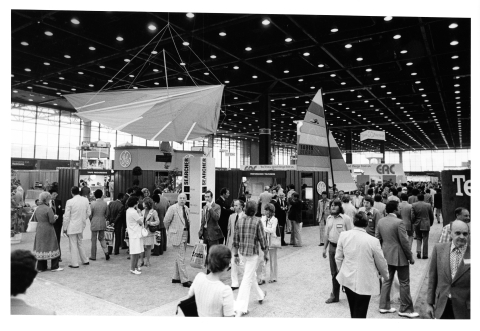CES Has Debuted Next Generation Consumer Technology for 50 Years

The Consumer Electronics Show (CES) debuted in June 1967 as a response to the growing demand for consumer electronics products. The Americana and New York Hilton hotels hosted 117 exhibitors showing off such state-of-the-art technology as transistor radios and small black-and-white TVs to 17,500 attendees.
In 1963, after noticing a shift in consumer culture, Jack Wayman founded the Electronic Industries Association – what is now the Consumer Technology Association (CTA, which owns and produces CES). Within a few
years, the next step was to launch an event to drive the industry forward.
The early CES events featured popular products like CB radios and color TVs. Since then, nearly every next-generation technology product of the past five decades has made its debut at CES. In fact, it is estimated that
700,000 new products have launched at CES over the years, including:
- VCR (1970)
- Camcorder and Compact Disc Player (1981)
- DVD (1996)
- HDTV (1998)
- Satellite radio (2000)
- Curved TVs, 3D Printers, and wearable tech (2014)
- Virtual reality and Unmanned systems (2015)
In 1972, the show moved to Chicago, and in 1978 it changed to a biannual event, with summer events in Chicago and winter ones in Las Vegas. But in 1998 the summer event ended and CES has been a January staple in Las Vegas ever since.
CES 2016 featured 3,887 exhibiting companies covering 2,475,646 net square feet at the Las Vegas Convention Center, Sands Expo Convention Center, the Venetian and several more venues along the Vegas Strip.
Over the years, the CES stage has hosted industry pioneers as well as Hollywood legends such as Tom Hanks, Robin Williams, Lady Gaga and Justin Timberlake. World leaders, such as Paul Kagame, president of Rwanda, have used CES as a platform to discuss the impact of technology on their country.
“Today, CES spans 24 product categories featuring technologies once unimaginable, including autonomous vehicles, robotics, smart home, 3D printing, and wearables,” said Allison Fried, director of Global Event
Communications for CTA.
In 2012, CES launched the Eureka Park and University Innovations areas, which are dedicated to up-and-coming technology startups, providing them with exposure to potential investors and partners.
At CES 2017, more than 3,800 exhibitors, including 600 startups, will unveil their innovations. The show is now the world’s largest innovation event, representing every aspect of the consumer technology industry, from tech giants to entrepreneurs. “In fact, 20 percent of exhibitors at CES 2017 didn’t exist as companies merely three years ago,” Fried said.
Nine current exhibitors who were part of that first show will be honored at CES 2017: 3M, Lenovo, Memorex (now called MEM-CE), Panasonic (the only company who has exhibited every year), Philips, Sharp, Sony, Toshiba, and Westinghouse.
“As the consumer technology industry evolves and expands, so too does CES,” Fried said. “We (show organizers) strive to make CES a great business experience for everyone who attends the show – including our exhibitors, buyers, manufacturers, installers, media and beyond. We value our customers and partners, including the Las Vegas Convention and Visitors Authority, and we work diligently year-round to ensure everyone who attends CES has a successful experience.”


Add new comment